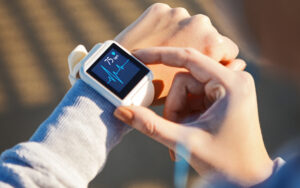Study reveals smartwatches could detect heart issues before a Heart attack

In recent years, the technology on your wrist has become much more than just a fitness tracker. Smart watches equipped with advanced health-monitoring features are showing promise in helping detect serious medical conditions, including heart attacks. While these devices can’t replace a doctor’s expertise, new research indicates they might be able to alert you to early warning signs of a heart attack, potentially saving lives.
The Role of Smart watches in Health Monitoring
Smart watches today come with a variety of health sensors, such as heart rate monitors, oxygen saturation sensors, and even built-in electrocardiogram (ECG) functions. These tools allow the device to monitor your heart’s activity around the clock, identifying irregularities that could indicate a heart problem.
What Does the Research Say?
A recent study suggests that smart watches could be useful in detecting subtle signs of heart issues before they escalate into life-threatening situations. The continuous monitoring of heart rate and rhythm allows for early identification of irregular patterns that could signal the onset of a heart attack. Users may receive notifications of unusually high or low heart rates, irregular rhythms, or other abnormal readings that warrant further investigation.
Cardiologists Weigh In
Medical professionals acknowledge the benefits of smart watches in monitoring cardiovascular health. Cardiologists confirm that these devices can provide important real-time data, especially for individuals with known heart conditions. By keeping track of your heart rate and rhythm throughout the day, a smart watch can help detect issues like AFib, which might otherwise go unnoticed.
Should You Rely on Your Smart watch?
While the benefits of wearing a smart watch for heart health monitoring are clear, it’s important to keep expectations in check. A smart watch can alert you to potential problems, but it cannot diagnose a heart attack or replace an electrocardiogram performed by a doctor. If you experience symptoms like chest pain, shortness of breath, or discomfort in your arm or jaw, it’s critical to seek immediate medical attention, regardless of what your smart watch says.
Smartwatches are proving to be more than just trendy gadgets. With their ability to monitor heart rate, rhythm, and other vital statistics, they offer valuable tools for detecting early signs of a heart attack. Cardiologists are optimistic about their potential but advise caution in relying solely on these devices for diagnosis. When used alongside regular check-ups and professional medical care, your smart watch could help you stay proactive about your heart health.



